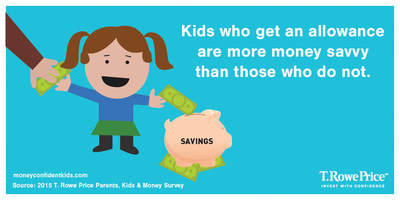T. Rowe Price: Kids Who Get An Allowance Are More Money Savvy Than Those Who Do Not
Experience the interactive Multimedia News Release here: http://www.multivu.com/players/English/7455231-t-rowe-price-financial-education
"If parents talk about money but don't let their kids experience it, it's like telling them how to play the piano without letting them touch one and expecting that they'll be able to play a sonata. Conversations can guide experience, and experience can put those conversations into practice—the two work together."
Since 2009,
THE VALUE OF TALKING ABOUT MONEY
- Talking to kids about money empowers them. Parents who have frequent discussions with their kids about financial topics are more likely to have kids who:
- Say they are knowledgeable about managing personal finances (46% vs. 14%).
- Say they are knowledgeable about investing (33% vs. 8%).
- Say their parents do a good job teaching them about money (67% vs. 32%).
- Understand the value of a dollar (92% vs. 84%).
- Feel they are smart about money (49% vs. 26%).
- Parental conversations with each other are associated with money confident kids. Parents who have frequent discussions with each other about financial topics are more likely to have kids who:
- Say they are knowledgeable about managing personal finances (39% vs. 16%).
- Think their parents are doing a good job teaching them about finances (58% vs. 32%).
- Think they will go to college (86% vs. 72%).
- Feel they are smart about money (45% vs. 24%).
- Even arguing can lead to kids feeling smarter. Parents who have frequent arguments with each other about financial topics are more likely to have kids who:
- Think their parents are doing a good job teaching them about finances (67% vs. 44%).
- Feel they are smart about money (61% vs. 33%).
- Parental conversations with each other are associated with better financial behaviors. Parents who have frequent discussions with each other about financial topics are more likely to:
- Follow a household budget (79% vs. 59%).
- Regularly save for kids' college education (65% vs. 41%).
- Contribute regularly to savings (91% vs. 82%).
- Have an emergency fund (88% vs. 75%).
USING MONEY EXPERIENCES AS A TEACHING TOOL
- Parents who give kids an allowance are more likely to have kids who:
- Think their parents are doing a good job teaching them about finances (52% vs. 31%).
- Say their parents set a good financial example (88% vs. 78%).
- Say they are knowledgeable about managing personal finances (32% vs. 16%).
- Say they understand the value of a dollar (90% vs. 81%).
- Discuss saving for college with their parents (62% vs. 45%).
- Feel they are smart about money (40% vs. 25%).
- Parents who let kids make financial mistakes are more likely to have kids who:
- Say they are knowledgeable about managing personal finances (36% vs. 16%).
- Say they are knowledgeable about investing (26% vs. 8%).
- Say their parents do a good job teaching about money (52% vs. 40%).
- Think they are smart about money (44% vs. 26%).
- Student loans as a teaching tool: Parents who think kids should have student loans to learn about debt are more likely to have kids who feel they are knowledgeable about student loan debt (28% vs. 5%).
- Some parents support teaching with credit cards: Parents who think kids should have credit cards so they can learn about managing debt are more likely to have kids who are knowledgeable about credit (33% vs. 9%).
COMBINING CONVERSATIONS AND EXPERIENCES CAN HAVE THE MOST IMPACT
- Knowledge of managing personal finances: There is a significant interaction between having discussions and the degree to which parents provide or are willing to provide kids with money experiences. Kids of parents who have frequent money discussions and provide the highest number of learning opportunities (i.e., giving an allowance, letting them make mistakes, thinking they should have credit cards or student loans) are significantly more likely to have knowledge of managing personal finance (68% vs. 0%).
- Kids who think they are smart about money: Kids of parents who have frequent discussions and provide the highest number of learning opportunities (i.e., giving an allowance, letting them make mistakes, thinking they should have credit cards or student loans) are significantly more likely to think they are smart about money (70% vs. 15%).
ABOUT THE SURVEY
The seventh annual
ABOUT
Founded in 1937,

To view the original version on PR Newswire, visit:http://www.prnewswire.com/news-releases/t-rowe-price-kids-who-get-an-allowance-are-more-money-savvy-than-those-who-do-not-300134202.html
SOURCE
News Provided by Acquire Media

